Having done business at Binh Dien wholesale market for more than 20 years, many small traders are now "scratching their heads" trying to find ways to absorb losses when the business situation has never been as difficult as it is now.
"Broken" connection, competing with the flea market
At noon, Mr. Luong Van Chinh, an agricultural product trader at Binh Dien wholesale market (Binh Chanh district, Ho Chi Minh City), rode his motorbike home to rest.
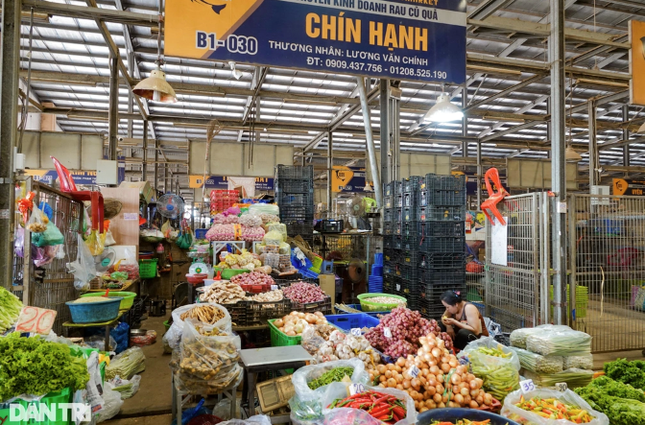 |
Mr. Chinh's agricultural stall at Binh Dien market (Photo: Nguyen Vy). |
Monthly revenue dropped by nearly 50%, Mr. Chinh was no longer busy and bustling with his stall all day. He went home to take a nap, leaving the stall to the workers to manage.
Talking about the business situation of his stall in the months after Tet 2024, the male vendor just smiled and looked bored.
"It's very sluggish! I've been in business since the market's early days and have never seen a decline in revenue like this. After the Covid-19 period, business "prospered" for a year and then quickly deteriorated," said Mr. Chinh.
The trader said that output has gradually decreased because his customers are importing fewer items than before. For example, instead of placing an average order worth 1 million VND, his customers now only spend about 500,000 VND.
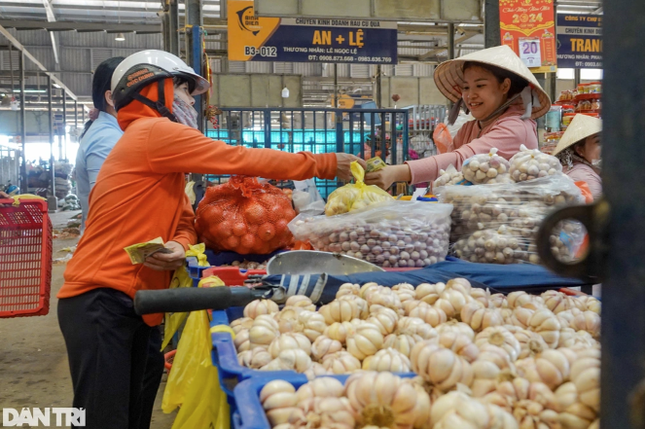 |
Many retailers said that despite reducing prices, sales are still on the decline (Photo: Nguyen Vy). |
In addition, Mr. Chinh's stall also has to compete with small-scale agricultural vendors on the sidewalk and in the flea market. Every month, the male trader has to "swallow his tears" when looking at the bills for expenses such as stall rent, electricity, water, employee salaries, capital for importing goods, etc.
"They forced us to sell our prices a lot. For example, with vegetables, we had to sell them for 8,000 VND/kg while the original price was already 8-9,000 VND/kg. If we didn't sell them, they wouldn't buy them anymore. Agricultural products would spoil if left for a long time, so traders had to grit their teeth and sell them. There were many months when I had to bear the loss and use my own money to maintain the business," Mr. Chinh sighed.
Not far away, the stall of Ms. Kim Cuong, a spice trader at the market, is not doing much better. Ms. Cuong's brand at Binh Dien market used to have customers from all over the country. The monthly output supplied to the market is very large.
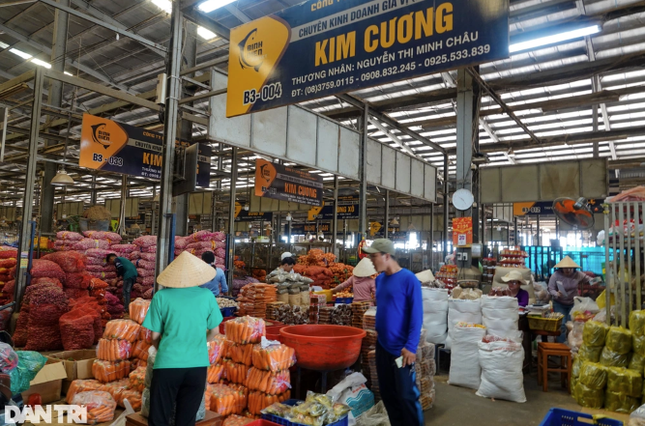 |
To "feed" more than 10 workers, Ms. Kim Cuong has to accept low profits and keep her capital to survive (Photo: Nguyen Vy). |
But in recent years, Ms. Cuong has been worried because many regular customers in the provinces and cities have suddenly… disappeared. The trader said that after the Covid-19 period, revenue has decreased every year, and has now lost 30-50% compared to before.
"The market usually operates in the evening, bustling from 9pm until the next morning. Now, the bustling scene only lasts until midnight. Going home earlier makes me... cry," said Ms. Cuong.
Save the business
It is known that Ms. Kim Cuong owns 6 stalls at the market. Of these, she uses 1 stall as her main business location, the remaining 5 stalls are warehouses or for rent.
Pointing to the rows of stalls around her, she shook her head: "There are many people here who can't make it, so they have to stop selling and rent out their stalls to save up capital and wait for the day they... return. I'm also one of the traders who have been operating since the market's founding. Honestly, the market has been very quiet lately, I've never seen such a difficult situation."
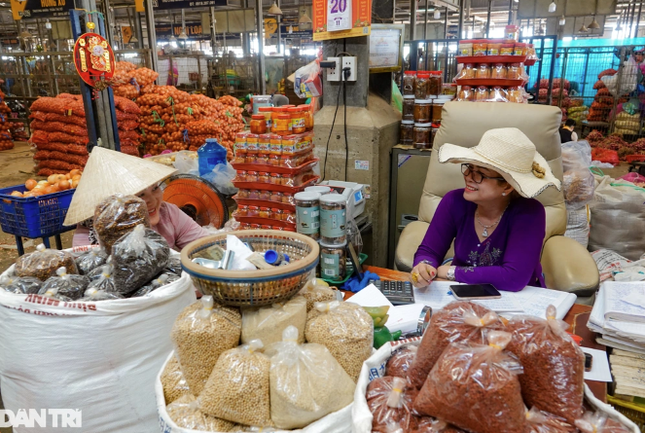 |
Small traders are sad when they no longer witness the bustling scene both morning and night at the largest wholesale market in Ho Chi Minh City (Photo: Nguyen Vy). |
Although fortunately she has not had to transfer her stall, Ms. Cuong worries every day about the difficult economic situation.
Binh Dien Market Management and Business Company recorded an output of 2,400 tons/day in the last 3 months of 2023, down 10-20% compared to the same period in 2022.
"In my opinion, the reason is partly due to the fact that many businesses have gone bankrupt, workers are unemployed, and have returned to their hometowns. Small traders in markets that provide labor for workers are facing a slump, causing small traders in wholesale markets like us to also face difficulties.
In addition, when the Covid-19 epidemic occurred, wholesale markets had to close, many small and retail vendors appeared on the sidewalk, and flea markets also "sprouted". Consumers have since developed the habit of buying goods outside and are no longer interested in entering wholesale markets," Ms. Cuong commented.
Ms. Cuong's stall has more than 10 employees. Because she doesn't want to lay off or owe anyone wages, Ms. Cuong has to accept a reduction in profits, trying to preserve capital, waiting for the day of recovery.
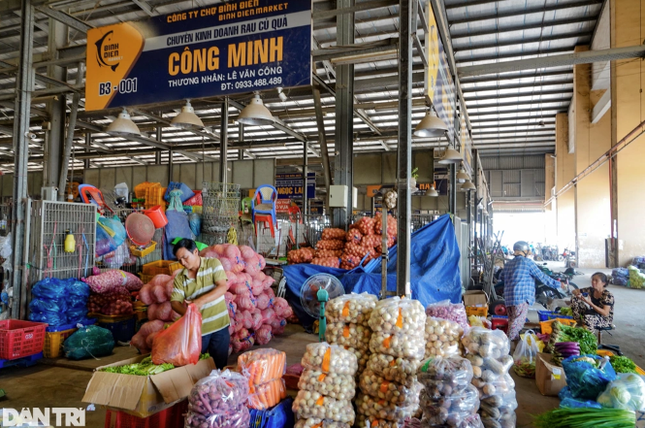 |
To cover losses, many small businesses have to cut staff, reduce business scale, and import fewer goods (Photo: Nguyen Vy). |
Mr. Van Chinh said that his stall used to have 2-3 workers, now he can only keep 1 person. Lacking staff, Mr. Chinh has to work twice as hard as before. All work now has the participation of this stall owner.
"With difficulties like this, we have to turn around and think. There is no other way. We have been doing business and working at this market for a long time. Now it is difficult to quit and do something else. Looking at the general situation, we are determined to stick with this job," Mr. Chinh plans.
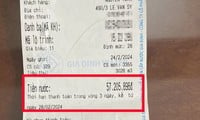




According to Dan Tri
Source


















![[Podcast] Digital transformation handbook for traditional market traders officially launched](https://vphoto.vietnam.vn/thumb/402x226/vietnam/resource/IMAGE/2025/6/17/82611c9570c74eec8939ddee46fec23d)



















![[Photo] The 9th Congress of the Party Committee of the Office of the President, term 2025-2030](https://vphoto.vietnam.vn/thumb/1200x675/vietnam/resource/IMAGE/2025/6/20/78e7f27e8c4b4edc8859f09572409ad3)























![[Maritime News] Wan Hai Lines invests $150 million to buy 48,000 containers](https://vphoto.vietnam.vn/thumb/402x226/vietnam/resource/IMAGE/2025/6/20/c945a62aff624b4bb5c25e67e9bcc1cb)











































Comment (0)